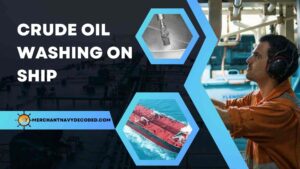
Crude Oil Washing
1:- Understanding Crude Oil Washing Onboard Crude oil washing (COW) is a compulsory task that the masters and officers of the ship handle during voyages that mainly concern the shipment of
How can we help you today?
Do you want to join Merchant Navy?
Are you already in Merchant Navy?
Which course are you interested to join?
IMUCET/DNS/B.Sc/B.Tech
GP Rating
ETO
GME
Check your eligibility for IMU CET
Know top colleges for DNS/B.Sc/B.Tech
Get complete information about IMUCET/DNS/B.Sc/B.Tech
Get study material for IMU CET preparation
Check your medical eligibility
Do you still have something to ask?
Bosun
Fitter
Able-Bodied Seaman
Ordinary Seaman
Oiler/Wiper
Steward
Chief Cook
Check if you are eligible to give 3rd officer exams from UK
Check if you are eligible to give 3rd officer exams from India
Get complete information to give exams from UK
Get complete information to give exams from India
Gain financial education to retire early
As a seafarer gain knowledge before buying insurance
Check if you are eligible to give 4th Engineer exams from UK
Check if you are eligible to give 4th Engineer exams from India
Get complete information to give exams from UK
Get complete information to give exams from India
Gain financial education to retire early
As a seafarer gain knowledge before buying insurance
Coming Soon...
Trainee Marine Engineer
4th Engineer
3rd Engineer
2nd Engineer
Chief Engineer
Deck Cadet
3rd Officer
2nd Officer
Chief Officer
Captain
Coming Soon...
Coming Soon...